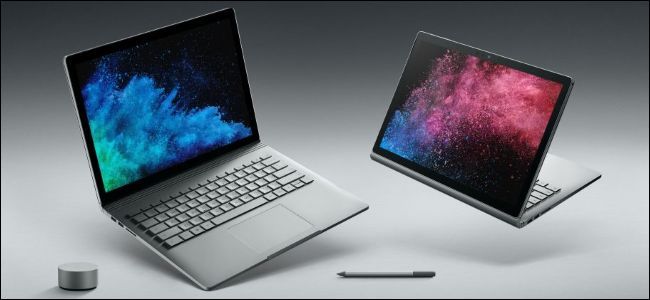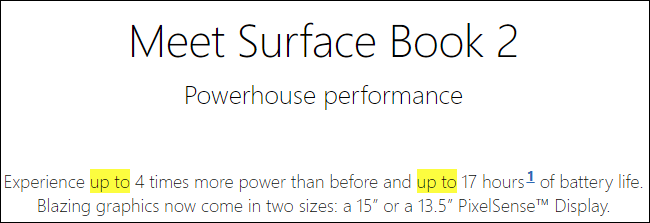Quick Links
Laptops promise anywhere from 15 to 24 hours of battery life, but you'll be lucky to get 10 hours. Those estimates aren't wrong, and there's no mistake: Manufacturers choose the most unrealistic benchmark with the highest numbers.
Everyone Does It
All PC laptop manufacturers trumpet their overly optimistic numbers because they have to. Everyone else does it. If one manufacturer is realistic and advertises 8 hours of battery life under regular use while other manufacturers advertise 15, that one honest manufacturer will get overlooked.
That's obvious, of course. The real question is: How do laptop manufacturers get away with it?
Manufacturers aren't lying---well, some of them might be, but they generally aren't. Those unrealistic battery life numbers come from a real benchmark, and they're couched in weasel words.
The Weasel Words: "Up To"
If you look close, you'll see the words "up to" before the battery life estimate. The manufacturer doesn't promise 16 hours of battery life; it promises "up to 16 hours." You'll get 16 hours in the ideal, perfect circumstances---not under regular PC use.
These weasel words are common in all sorts of advertising. A store that says you will "save up to 50%" on your purchase isn't lying even if you save only 3%. An internet service provider that says you'll get "up to 50 Mbps" is technically telling the truth even if you get only 30 Mbps. That's why there's a good chance you aren't reaching the internet speeds for which you're paying.
It's All About Video Playback
The words "up to" aren't a license to make up numbers out of thin air. Otherwise, manufacturers would say you'd get "up to a million years" of battery life. They need real numbers, and they get them from a single ideal benchmark that doesn't represent real-world usage.
Here's a secret: It's all about video playback. Manufacturers start playing video on the laptop and time how long it takes for the laptop's battery to die. They just let a video play until the laptop dies, and that's it. They might disable background features and set the screen brightness to lower than normal levels, too.
Of course, this isn't a secret. It's buried in the fine print most people don't read.
Video Playback Uses Less Power Than Other Tasks
Constant video playback isn't representative of regular use. Who is going to sit down with a laptop and watch 16 hours of non-stop video without doing anything else?
Manufacturers don't care whether this represents your experience or not. They use this benchmark because it produces the longest battery life.
Modern laptops (and smartphones) use hardware-accelerated video decoding. The laptop has special hardware in its graphics processor unit (GPU) that efficiently decodes the video while using as little power as possible, keeping CPU usage down. For example, when you play an MP4 video---even if it's on a website or in an app---this kicks into gear and saves you power.
This is a great feature. It helps save battery life and keeps your laptop (or smartphone) running cool while you watch videos. However, manufacturers abuse it by using this number to boast about battery life. Anything else---whether it's browsing a single website or just writing a document in Microsoft Word---will use more battery power than playing videos.
PC manufacturers often benchmark battery life using Windows 10's included Movies & TV app, which is always set up to use the PC's hardware acceleration, if available. This feature is not available in every video player, and may not always be enabled by default if it is. For example, you might need to enable hardware acceleration in VLC if that's your preferred video player.
Look for Real Benchmarks
Rather than relying on manufacturer benchmarks, it's best to find independent reviews of the laptops you're considering buying. Reviewers benchmark laptops under a variety of scenarios, so you can see what the battery life will look like under a simulated web browsing test that's more indicative of normal, day-to-day use.
For example, while Microsoft touts up to 17 hours of battery life on the Surface Book 2, Anandtech found it lasted for about 9.7 hours while browsing the web. That's still a great battery life, but it's nowhere near 17 hours.
We don't want to single Microsoft out here, either. Every PC manufacturer uses these exaggerated numbers to boast about battery life. Microsoft is playing the same game everyone else is.
Perfect Battery Life Estimates Are Impossible
Battery life is always hard to estimate. Even while you're using a laptop, Windows might go from saying you have five hours left to only two hours depending on what you're doing.
That's because performing more demanding activities on your laptop increases power consumption. A laptop won't use much power while it's just playing hardware-accelerated video on low brightness but increase the brightness level, and it'll draw more power. If you start a demanding task that requires CPU power, it will draw even more power.
That's the real problem. Laptop battery life varies dramatically depending on what you're doing. Manufacturers have decided to take the most unrealistic number they can find, but there's no single battery life estimate that would work for everyone. However, a battery life test that simulates normal web browsing would be much more accurate and useful for most people.
Image Credit: Microsoft




